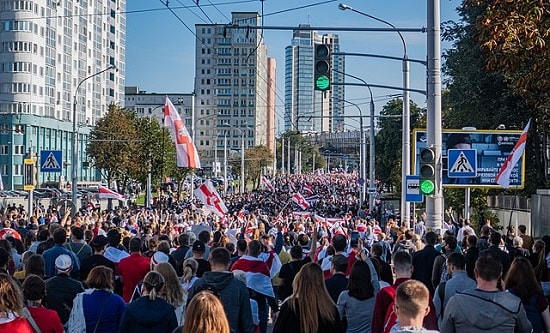
Following the 2020 presidential election in Belarus on 9 August Alexander Lukashenko, who has been president of the country since 1994, was declared the winner with 80.23% of the vote. According to the official announcement, the main opposition candidate Svetlana Tikhanovskaya received just 9.9%. Before the vote even took place the opposition had stated that the election would be fraudulent, and when the result was announced they called people out onto the streets against the regime. Demonstrations took place throughout August and September with over 100,000 people involved in some of the mobilisations in the capital city Minsk. The red and white flag displayed on the demonstrations has in recent history been associated with anti-Soviet and fascist expressions of Belarusian ‘independence’. The demands of the demonstrations have centred on calling for the resignation of Lukashenko but the organised opposition, the Coordination Council, have openly pro-imperialist demands which call for the privatisation of state-owned industry, the end to economic, military and cultural links with Russia, and for Belarus to join both the EU and NATO.
Belarus is positioned in the centre of Eastern Europe bordered by, among other countries, Poland, Ukraine and Russia. Since the collapse of the Soviet Union it has been allied with Russia with both countries agreeing in 1996 to form a ‘Union State’. Since then imperialism has been working to break the link between Belarus and Russia and draw Belarus into the orbit of both the EU and NATO. As Russia under Putin’s Presidency became more of a block to imperialism’s interests these attempts have increased. In 2004 the EU imposed travel sanctions on named government officials in Belarus followed in 2006 by the US imposing limited economic sanctions. In 2008 Belarus expelled the US ambassador due to increasing US sanctions. A US ambassador only returned to Minsk in April 2019. This did not prevent the US National Endowment for Democracy funding 34 opposition organisations to the tune of approximately $1.5m in pursuit of imperialism’s political agenda.
Under Lukashenko Belarus escaped the ‘shock therapy’ of mass privatisations, unemployment and massive drop in living standards for the working class that swept eastern Europe and Russia after the collapse of the socialist states. Belarus kept large factories and industrial plants under state control, education and health care basically remained free. This is one of the reasons that Lukashenko has remained as President until now. It is also one of the main reasons that the imperialists want to get rid of him.
Although Belarus and Russia agreed to the ‘Union State’ in 1996 and signed a declaration in 1999 that said the two countries would work towards full integration Lukashenko has resisted any dilution of his position by any fundamental change. The main economic advantages of the ‘Union State’ for Belarus has been cheap oil and open trade with Russia. At the end of 2018 the cheap oil deal hit a snag and Russia briefly stopped the supply of oil. In response Lukashenko purchased oil shipments from Azerbaijan, Norway and Saudi Arabia capitalising on the cheap world price of oil. He then opened negotiations with the US resulting in the visit of US Secretary of State Mike Pompeo to Minsk in February 2019, the first time a senior US official had visited Belarus since Lukashenko became president. That April the two countries formally re-established diplomatic relations with a US ambassador back in Minsk and following this in June a shipment of US oil arrived in Belarus. Belarus has also developed economic links with China with the building of the China-Belarus Industrial Park near Minsk, which is the largest industrial park China is developing in Europe and is an important part of its Belts and Road Initiative. This attempt by Lukashenko to play ‘both sides’ in the growing inter imperialist battles in the world has backfired with the imperialist backed demonstrations against the election result and his continuing rule.
The impetus for the demonstrations against Lukashenko has come from a growing middle class in Minsk and other cities which has developed over the past decade or so around an expanding information technology sector and connected growth of minor entrepreneurs in the service sector. They feel limited by the continuing authoritarian rule of Lukashenko and, influenced by pro-imperialist propaganda from the opposition, look to the EU as a way out. But they are a minority and will be unable to remove Lukashenko and his allies unless the working class come out onto the streets in large and consistent numbers. However, there is no movement at the moment putting forward demands that represent the independent interests of the working class.
A 22 August report on the NATO aligned website the Atlantic Council shows the limitations of the present protests and laments the absence of the fascist thugs that were central to events in the Ukraine,
‘The protesters are generally very sweet, polite, and peaceful. Many are young, middle class Belarusians who work in the country’s booming IT industry and come to rallies dressed in form-fitting hipster ensembles. Unlike events in Kyiv in 2013-14, there is no militant edge to the demonstrations. Indeed, this revolution is so velvet that at times it feels positively sleepy. For better or worse, there is a marked absence of the rough and stalwart young men capable of making liberals uncomfortable or leading the resistance if and when the authoritarian state decides to deploy force.’
Bob Shepherd




